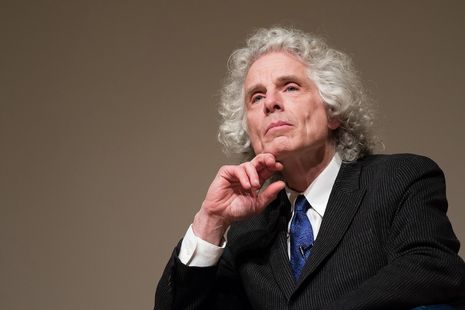Steven Pinker at the Cambridge Union: On Revolution and Conservatism
Ming Kit Wong covers the Harvard cognitive psychologist’s (virtual) visit to the Cambridge Union and discusses the political implications of his claims about human progress

As a history student, I attended a lecture two years ago during which it was argued that Professor Pinker’s highly acclaimed (and equally controversial) book, Enlightenment Now (2018), misportrayed the Enlightenment of the eighteenth century as a historical phenomenon. Pinker would (and in fact did) reply that his book is not a work of intellectual history, and that he uses “Enlightenment” only in the conventional sense to refer to “the ideal of using reason and science to advance human welfare”. His case for Enlightenment Now, therefore, rests on this understanding of the term.
Accordingly, Pinker opens his speech to the Cambridge Union with the claim that progress, defined as ‘improvements in human flourishing’, is an evident reality. What followed was a flurry of slides which presented statistics and graphs on key measures such as life expectancy, rates of poverty, the prevalence of peace and freedom, as well as quality of life and happiness across centuries—all of which worked to restate the central thesis of his 2018 book. In short, whilst he adds the caveat that ‘progress does not mean that everything becomes better for everyone, or everywhere, all the time’, Pinker maintains that the longue durée of human history shows progress to be an empirical fact that should be more widely acknowledged.
But although progress is for him “a real phenomenon”, Pinker is anxious to insist that it is “not a miracle” since it is neither “inevitable” nor “a matter of optimism.” According to him, human progress was the product of, and essentially consists in, the application of reason and science to the advancement of humanist principles. Progress is real, in other words, only to the extent that rationality and scientific knowledge serves the cause of humanism, as against religious morality, authoritarian nationalism and populism, or reactionary and revolutionary ideologies. And this, Pinker reminds us, is far from guaranteed.
“... since our natural state is chaos and disorder and decay, any institution that keeps us safe and fed and keeps us from killing each other has a prima facie case for not being abolished”
Nevertheless, Pinker explicitly positions himself against those for whom a pessimistic worldview is a surer guide to moral and political life than an optimistic one. In his view, ‘thoughtless pessimism’ is often more dangerous than the risk of any complacency that optimism might breed because the former encourages both fatalism and radicalism. On one hand, as Pinker explains, ‘if, despite all our efforts, the world is as bad as it was centuries ago, then why bother?’ On the other hand, ’if life gets worse and worse and worse, despite the best efforts of our institutions, then we might as well ‘smash the machine’, ‘drain the swamp’, ‘burn the empire to the ground’, or empower a demagogue who promises that ‘only I can fix it’.”
What underlies Pinker’s empirical and social scientific claims is therefore a political conservatism. Indeed, Pinker observes that radical revolutions in history generally make things worse: the Napoleonic, Russian, and Chinese Revolutions, according to him, were catastrophic. Even the American Revolution was disastrous, he argues, when compared with the “civilised” way in which Canada (where Pinker is from) attained its freedom. At this point, Pinker almost verges on rehearsing the Hegelian dictum, “what is rational is actual, what is actual is rational”: insofar as progress occurs in history despite human fallibility, Pinker believes that it is because rational institutions which have withstood the test of time provide the crucial framework within which progress can be secured.
For Pinker, reason and intelligent design are embodied in human institutions such as science and legal constitutions to the extent that we are in fact intelligent beings who impose our rationality upon the world. But he emphasises that this does not imply that all of our institutions are without problems; on the contrary, he points out that progress does not equate to perfection, that there are always improvements to be made, and that the solving of existing problems tend to create new ones. There is hence a marked tension between Pinker’s endorsement of progressive reform and conservative defense of existing social and political institutions. Pinker concedes as much when I pressed him on this issue, and admits that “I don’t think that there’s any algorithm for deciding when an institution should just be shut down.”
Despite this, Pinker insists that “there is an argument, which is really an adaptation from Edmund Burke, the first intellectual conservative, that since our natural state is chaos and disorder and decay, any institution that keeps us safe and fed and keeps us from killing each other has a prima facie case for not being abolished. Our natural state is one of squalor and violence because there are indescribably more ways of things going wrong than things going right. So unless you are living in the worst possible state of squalor, probably what you have is better than nothing. You are better off building on something that has taken you to a relative state of well-being, and focusing on solving our remaining problems, than assuming that you can just obliterate it and start from scratch.”
“If there are reasonable arguments, based on historical experience and data that people will be better off without it, then they should be abolished”
Pinker makes an eloquent case; but it is difficult to escape the conclusion that his optimism is based on a deep-rooted pessimism about the human condition. From this standpoint, almost any political regime can be justified on the minimalist ground that it is better than nothing. Indeed, this is precisely the defense of Western liberal democracy which Pinker offers: that it is “better than the alternatives” (although, when asked during the Union interview about whether the emerging Chinese model might represent a potential alternative, he confesses that “the honest answer is we don’t know”).
To be sure, Pinker tries very hard to avoid the extreme implications of his assumptions. “This can be taken too far: it doesn’t mean that all of the status quo is always worth preserving, and sometimes things should just be abolished across the board—slavery, for example, and racial discrimination—there can be institutions that are better off not existing. If there are reasonable arguments, based on historical experience and data that people will be better off without it, then they should be abolished,” he tells me.
But even if this is granted, I remain unconvinced about his fundamental political message. The owl of Minerva may allow us to see reason as the rose in the cross of the present and thereby to delight in the present (Hegel 1821), but this is possible only with the benefit of extraordinary hindsight and the risk of downplaying current discontents as mere trivialities.
 News / Colleges charge different rents for the same Castle Street accommodation2 March 2026
News / Colleges charge different rents for the same Castle Street accommodation2 March 2026 News / King’s hosts open iftar for Ramadan3 March 2026
News / King’s hosts open iftar for Ramadan3 March 2026 Theatre / Lunatics and leisure centres 4 March 2026
Theatre / Lunatics and leisure centres 4 March 2026 News / Angela Merkel among Cambridge honorary degree nominees27 February 2026
News / Angela Merkel among Cambridge honorary degree nominees27 February 2026 News / News in Brief: waterworks, wine woes, and workplace wins 1 March 2026
News / News in Brief: waterworks, wine woes, and workplace wins 1 March 2026








